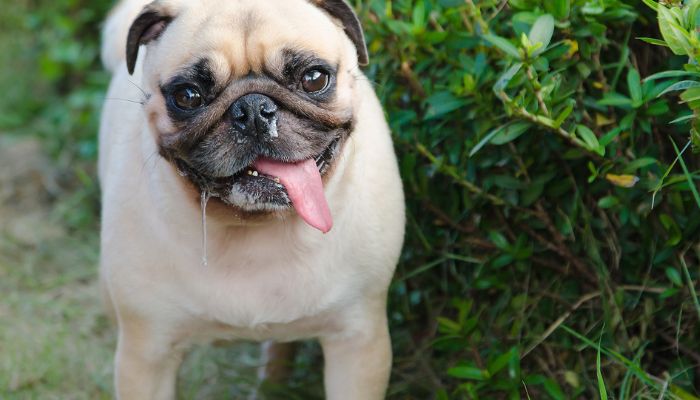
When most people think of dog saliva, they probably imagine it being fairly innocuous. After all, dogs are often considered to be man’s best friend.
However, there is actually a lot of bacteria present in dog saliva. In fact, studies have shown that there are more than 60 different types of bacteria found in dog saliva. While most of these bacteria are harmless, some can actually cause disease in humans.
For instance, one type of bacteria known as Pasteurella can lead to infections of the skin, respiratory tract, and even the bloodstream. In rare cases, this bacteria can even be deadly. As a result, it’s important to be careful when around dogs and to avoid contact with their saliva if possible.
However, if you do accidentally swallow dog saliva, there is no need to panic. The chances of contracting a serious illness are very low. Just be sure to wash your hands thoroughly afterwards and keep an eye out for any potential symptoms.
Is Dog Saliva A Poison To Humans?
While dog saliva may not be the most pleasant thing to think about, it is actually relatively harmless to humans. In fact, there are a number of antibacterial and antiviral properties in dog saliva that can actually help to protect against infection. Of course, it is still important to wash any open wounds that come into contact with dog saliva, but there is no need to panic if you accidentally get a little lick on the hand. So, while dog saliva may not be something you want to think about too much, it is actually not a cause for concern.
Is It Safe To Eat Dog Saliva?
You may have heard that dog saliva has antiseptic properties and can therefore be helpful in preventing infections. Some people even believe that dog saliva can help to heal wounds. However, there is no scientific evidence to support these claims. In fact, dog saliva can actually contain harmful bacteria that can cause infections. The best way to prevent infection is to keep wounds clean and dry. If you are tempted to let your dog lick a wound, it is best to seek professional medical advice first. In summary, there is no evidence to support the claim that dog saliva has any benefits. In fact, it may actually be harmful. Therefore, it is best to avoid letting your dog lick any open wounds.
Can Dog Saliva Make You Sick?
Researchers have conducted studies on how dog saliva affects humans. In one study, dogs with salivary glands that produce high levels of bacteria called Streptococcus mitis were found to be the cause of a potentially life-threatening bacterial infection called bacteremia.
The researchers tested the amount of bacteria in the blood of both dogs and humans who were infected with the disease, and found that the concentration of the bacteria was higher in human patients than in the dog samples. Dogs who exhibit abnormal levels of saliva are usually the ones that have problems with their salivary glands.
Is Dog Saliva Harmful For Human Health?
Some dog owners may be worried that their pet’s saliva could cause problems for humans. However, most dog owners are quite unaware that, in fact, there are several kinds of bacteria found in dogs’ saliva that could pose a threat to human health. There are three main types of bacteria that dog saliva can carry, which are:
Staphylococcus aureus – Found in the skin of both animals and people, Staphylococcus aureus can cause a range of illnesses, from minor infections such as cuts and abscesses to more serious conditions like pneumonia and sepsis.
Can You Get Rabies From Swallowing Saliva?
While the thought of being infected with rabies may be enough to make your skin crawl, it’s important to remember that this disease is relatively rare in humans. In fact, according to the World Health Organization, there are only about 55,000 cases of rabies worldwide each year. And of those, only two or three are the result of human-to-human transmission.
So, while it is technically possible to get rabies from swallowing saliva, it’s extremely unlikely. The vast majority of rabies cases in humans are caused by contact with an infected animal, typically through a bite or scratch.
Once the virus enters the body, it travels up the nerves to the brain, where it causes inflammation and ultimately death. There is no cure for rabies once symptoms start to appear, so it’s important to take measures to prevent exposure in the first place.
For example, if you’re traveling to an area where rabies is common, be sure to get vaccinated before you go. And if you do come into contact with a potentially infected animal, wash the wound immediately and see a doctor as soon as possible. By taking these precautions, you can help to keep yourself safe from this deadly disease.
Is Dog Saliva Good For Your Wounds?
The short answer is yes, dog saliva can be good for your wounds. Dog saliva contains a number of antibodies and proteins that can help to fight infection and promote healing. In fact, studies have shown that dog saliva can be effective in treating both bacterial and viral infections. However, it is important to note that not all dogs have the same level of immunity.
So, if you are considering using dog saliva to treat a wound, it is best to consult with a veterinarian first. Finally, while dog saliva can be beneficial for wounds, it is important to remember that it can also transmit diseases. So, it is important to take precautions when around dogs, especially if you have an open wound.
What Happens If I Eat Dog Saliva?
While many people believe that dog saliva has antiseptic properties, the truth is that it can actually pose a serious health risk. When dogs lick their wounds, they introduce bacteria into the open wound which can lead to infection. In addition, dogs often carry Salmonella in their mouths, which can be transmitted to humans through licking.
While the risk of infection is low, it is still important to take precautions when coming into contact with dog saliva. If you are bitten or licked by a dog, be sure to wash the area thoroughly with soap and water. And if you have any cuts or open wounds, avoid letting a dog lick them as this could increase your risk of developing an infection.
Can Rabies Be Transmitted By Touch dogs?
Can rabies be transmitted by touch? The short answer is no. Rabies is a virus that is transmitted through saliva, typically via a bite from an infected animal. While it is possible for the virus to be present in other body fluids, such as urine or blood, there is no evidence that it can be transmitted through casual contact.
As a result, you don’t need to worry about contracting rabies from petting a dog or being around one. However, it is still important to take precautions when handling animals, as rabies is not the only disease that can be transmitted through bites and scratches.
If you are ever bitten or scratched by an animal, it’s important to clean the wound immediately and see a doctor to ensure that you don’t develop any infections.
Can You Get Rabies From Dog’s Saliva?
The short answer is no – you can’t get rabies from dog’s saliva. Rabies is a virus that attacks the central nervous system, and it is most commonly transmitted through the bite of an infected animal. The virus enters the bloodstream and travels to the brain, where it causes inflammation and eventually death.
Saliva does not contain enough of the virus to cause infection, and even if it did, the acid in your stomach would kill the virus before it had a chance to enter your bloodstream. However, that doesn’t mean that you should let a dog with rabies lick your face. The virus can also be present in other body fluids, such as urine and feces, so it’s best to steer clear of any animal that appears to be sick.
If you are bitten by an animal suspected of having rabies, you should seek medical attention immediately. While there is no cure for rabies, early treatment can be effective in preventing the disease.
Dog saliva (dog kisses) may transfer bacteria to humans
Though many people enjoy the affection of a dog kiss, there is potential for dog saliva to transfer bacteria to humans. In fact, a study published in the journal Microbiome found that dogs carry a variety of bacteria in their mouths, some of which may be harmful to humans.
The study found that dogs are particularly likely to harbor strains of staphylococcus and Enterococcus, both of which can cause infections in humans. In addition, dogs may also carry other harmful bacteria, such as E. coli and Salmonella.
While the risk of infection from dog kisses is relatively low, it is still important to be aware of the potential risks before engaging in this activity. For those who are concerned about the spread of bacteria, it may be best to avoid dog kisses altogether.
You can get hookworms and other parasites from dog saliva
If you’ve ever been licked by a dog, you may have wondered if there’s any risks associated with the slobbery act. As it turns out, there can be. While most people don’t get sick from a dog lick, it is possible to contract certain parasites, such as hookworms, from contact with dog saliva. Hookworms are small, parasitic worms that live in the intestines of animals.
They can cause diarrhea, weight loss, and anemia in their hosts. In severe cases, hookworms can be fatal. Although hookworms are more common in dogs than in humans, it is possible for people to become infected.
The best way to prevent infection is to avoid contact with dog saliva, especially if you have an open wound. If you do come into contact with dog saliva, wash the area thoroughly with soap and water.
Dog saliva helps prevent canine cavities
While most people are familiar with the idea that dog saliva can cause infections in humans, few are aware of the fact that it can also help to prevent canine cavities. In a recent study, researchers found that dogs who licked their owners’ faces had a significantly lower risk of developing cavities than those who didn’t.
The reason for this is that dog saliva contains enzymes that help to break down plaque and bacteria. In addition, dogs typically lick their mouths after eating, which helps to remove food particles from teeth. As a result, regular exposure to dog saliva can help to keep teeth clean and free of cavities.
Final Verdict: What Happens If You Swallow Dog Saliva
A lot of dog owners have been wondering – what happens if you accidentally swallow dog saliva? Is it harmful to humans? The short answer is no, swallowing small amounts of dog saliva is not harmful to humans and will not make you sick. In fact, there are some health benefits to ingesting dog saliva, as it contains enzymes that can help to break down food. However, it is important to note that dog saliva can also contain bacteria that can cause infections in people with weak immune systems. As a result, it is always best to err on the side of caution and avoid contact with dog saliva whenever possible.
